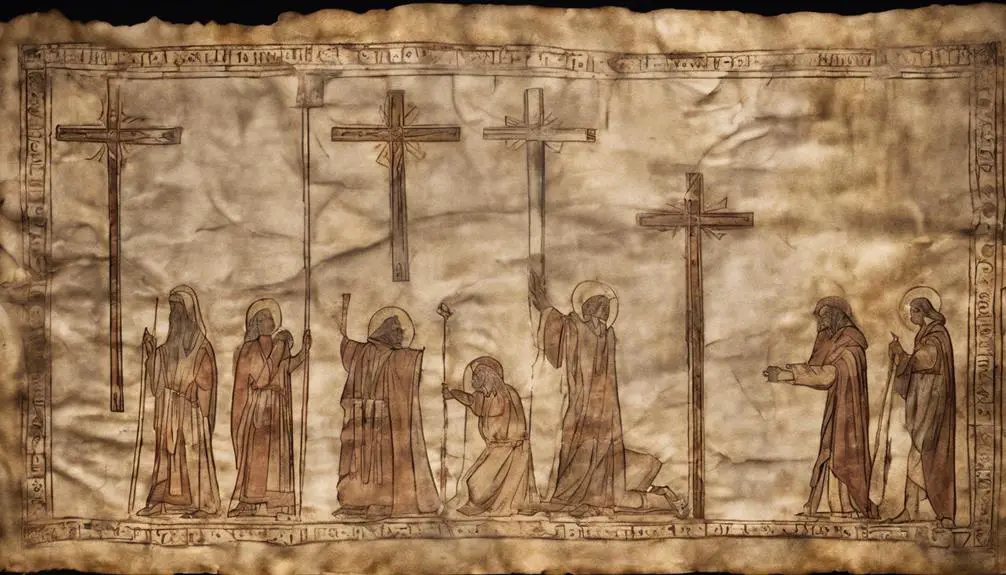Yearn to understand the dynamic book before Romans, Acts, that shapes Christian faith and sets the stage for Romans? Dive in and discover its richness.

Book Before Romans in the Bible
Peeling back the rich layers of the Bible, you encounter the book of Acts, the exciting bridge that connects the Gospels with the Epistles.
As you explore its historical context, key themes, and influence on early Christianity, you'll uncover how Acts sets the stage for Romans.
Who were the key figures in Acts, and how did their actions shape the Christian faith? Ponder on this and let's embark on a journey of discovery together.
Key Takeaways
- The Book before Romans in the Bible is Acts, narrating the early Church's expansion and apostolic miracles.
- Acts highlights Paul's conversion and significant missionary journeys, culminating in his arrival in Rome.
- The book of Acts serves as a bridge to Romans, linking historical narratives with theological exposition.
- It emphasizes the Holy Spirit's work and the development of the early Christian community, setting the stage for the theology in Romans.
Understanding the Acts of the Apostles

Diving into the Acts of the Apostles, you'll uncover a riveting narrative that charts the early Christian Church's expansion and evolution, offering a profound understanding of faith's resilience and transformative power. You'll encounter a series of apostolic miracles, where divine intervention visibly echoes through the lives of ordinary individuals, solidifying the burgeoning faith's credibility and reach. These miracles, ranging from healing the sick to raising the dead, aren't only awe-inspiring but also act as a testament to the apostles' divine authority, thereby strengthening the early Church's foundation.
Another pivotal event is Paul's conversion. This dramatic turnaround from a zealous persecutor of Christians to a dedicated apostle is undeniably one of the most significant turning points in the Acts. Paul's story serves as a beacon of transformative grace, epitomizing the power of faith to incite radical personal change. His subsequent missionary journeys, chronicled in detail in the Acts, help further propagate Christianity across the Roman Empire, thus shaping the Church's future trajectory.
Understanding these elements in the Acts of the Apostles allows you a glimpse into the vibrant and dynamic origins of the early Christian Church.
Historical Context of Acts

To fully grasp the depth of the Acts of the Apostles, it's crucial to delve into the historical context in which it was written. Understanding this context, particularly the Acts Authorship and Cultural Influence, will give you a richer comprehension of this biblical book.
Traditionally, Luke, a physician and companion of Paul, is considered the author of Acts. This authorship offers a unique lens into the early Christian community's struggles and triumphs. The religious and political climate of the time heavily influenced the narrative, reflecting a society in transition.
The cultural influence on Acts is significant. The narrative traverses various regions – Jerusalem, Judea, Samaria, and the ends of the earth, capturing diverse cultures, customs, and socio-political situations. This cultural immersion is evident in the narratives' style, language, and themes.
Here's a snapshot:
Acts Authorship |
Cultural Influence |
|---|---|
Traditionally attributed to Luke |
Influence of diverse regions |
Offers unique insights |
Captures various cultures and customs |
Reflects religious and political climate |
Immersion evident in style, language, and themes |
Understanding this context enriches your reading of Acts, enhancing its relevance and resonance even today.
Key Themes in Acts

Let's delve into the key themes in Acts, where you'll discover a rich tapestry of narratives that reflect the early Christian community's faith, resilience, and growth. Acts symbolism is quite profound, with the Holy Spirit taking center stage. It represents God's presence and guidance, empowering the Apostles to carry out their mission.
Additionally, Apostle transformations are a significant theme. Characters like Peter and Paul undergo radical changes, signifying the transformative power of faith. Peter, a simple fisherman, becomes a bold preacher, while Paul, a fervent persecutor of Christians, turns into their most passionate advocate.
Acts also underscores the theme of inclusivity. The Gospel's universality is highlighted through the Apostles' mission to both Jews and Gentiles, symbolizing the breaking down of religious and ethnic barriers.
Furthermore, the theme of suffering and perseverance is integral. The Apostles' trials, persecutions, and ultimate triumphs echo the hardships faced by the early Christian community, encapsulating their resilience and unwavering faith.
Acts as a Bridge to Romans

After exploring the thematic intricacies of Acts, it's crucial to understand how this book serves as a bridge to Romans, seamlessly linking the narrative of the early Christian community with the theological exposition that follows. Acts interpretation sets the stage for Romans' anticipation. As you delve deeper, you'll notice the transition from the historical narratives in Acts to the theological depth in Romans.
The link between the two books can be seen through three main points: narrative continuation, theological correlation, and audience connection. Here's a table to illustrate these points:
Point |
Acts |
Romans |
|---|---|---|
Narrative Continuation |
Concludes with Paul in Rome |
Begins with Paul's letter to Rome |
Theological Correlation |
Emphasizes the work of the Holy Spirit |
Expounds on the role of the Spirit |
Audience Connection |
Addresses the early Christian community |
Written to the same community |
This bridge doesn't merely connect two books; it's a fundamental transition from narrative storytelling to theological discourse. Without this link, understanding Romans would be more challenging as its teachings build on the stories and experiences recounted in Acts. Thus, Acts as a bridge to Romans is a pivotal aspect of biblical interpretation.
Impact of Acts on Early Christianity

Diving into the impact of Acts on early Christianity, you'll find that this pivotal book significantly influenced the development and spread of Christian doctrines and practices during its formative years. The 'Acts' influence was profound, shaping the core beliefs and principles that would define Christianity.
Through the accounts of the apostles' missions, Acts provided a blueprint for Christian expansion. It presented a model of evangelization, demonstrating that spreading the gospel wasn't limited to the Jewish community but was a universal message meant for all people. This concept of inclusivity facilitated the spread of Christianity beyond the boundaries of Jerusalem, across the Roman Empire, and eventually worldwide.
Moreover, Acts established the role of the Holy Spirit in Christian life. This not only empowered the apostles but also gave believers a sense of personal connection and guidance. It emphasized the importance of community, cohesiveness, and shared spiritual experiences, fostering a sense of unity and collective identity among early Christians.
Thus, Acts' influence was instrumental in shaping early Christianity. It provided the framework for Christian expansion, solidified key doctrines, and emphasized the role of the Holy Spirit, significantly impacting the growth and development of Christianity.
Frequently Asked Questions
Who Are the Key Figures Mentioned in the Book Before Romans in the Bible?
You're asking about key figures in the book preceding Romans. In Acts, major characters like Peter and Paul stand out. Peter's significance lies in his leadership among Jesus' disciples, while Paul's historical context analysis shows his transformation from persecutor to proclaimer of the faith.
They both play vital roles in the spread of early Christianity, contributing to the complex narrative and theological development of this crucial biblical book.
How Is the Book Before Romans Relevant to Modern Christianity?
Understanding the book before Romans enriches your comprehension of biblical context, enhancing your grasp of Christian principles. It's relevance to modern Christianity lies in its teachings, which provide timeless wisdom for life's challenges.
It offers valuable insights that inspire faith, guiding you in your spiritual journey. Delving into it deepens your faith, bridging the gap between ancient teachings and their modern faith applications.
It's a vital tool to navigate your Christian walk.
What Are Some Common Misconceptions About the Book Before Romans?
You might think the 'Acts' authorship debate is a modern development, but it's been ongoing for centuries. People often misconstrue the Gentile conversion controversy as a simple argument, when in reality, it's rooted in deep theological divides.
It's not just about who wrote it or who it was written for, but about the fundamental questions of faith and identity. Don't let common misconceptions cloud your understanding.
How Have Interpretations of the Book Before Romans Changed Over Time?
Interpretations of texts often evolve due to cultural influence and literary analysis. You've likely observed this with the book preceding Romans. Over time, readers' perceptions have shifted, as societal norms and understanding progress.
This evolution of interpretation isn't unique to this book, but is a common phenomenon in literary studies. It's a testament to the dynamic nature of textual interpretation, reminding us it's not static but fluid and ever-changing.
Are There Any Controversial Aspects or Interpretations of the Book Before Romans in the Bible?
Yes, there are indeed controversial aspects in interpreting the text preceding Romans.
The authorship debate, for instance, is a hot topic. Some believe it's a single author's work, while others argue multiple contributors.
Further, its cultural influence is vast yet varied, creating differing interpretations.
It's vital you consider these factors when delving into the text, as they can significantly impact your understanding and interpretation.
Conclusion
In essence, the book of Acts serves as a crucial bridge between the Gospels and Romans, setting the stage for Paul's teachings. Its historical context and key themes shaped early Christianity significantly.
By understanding Acts, you gain a deeper comprehension of the Bible's narrative and the foundations of Christian faith. As such, it's an essential prelude to Romans, offering layers of insight into the transformative power of faith and the growth of the early church.



Sign up